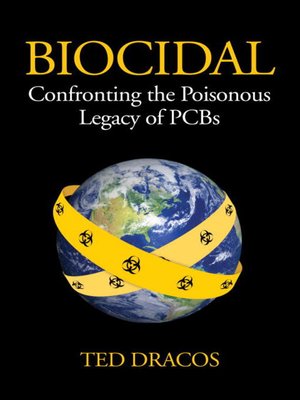
Sign up to save your library
With an OverDrive account, you can save your favorite libraries for at-a-glance information about availability. Find out more about OverDrive accounts.
Find this title in Libby, the library reading app by OverDrive.



Search for a digital library with this title
Title found at these libraries:
| Loading... |
The first full account of the scientific and political dynamics of global PCB contamination, and its threat to human health and the environment
Whether or not you've heard of PCBs (polychlorinated biphenyls), it's likely that this toxic chemical can be found in your cells. PCBs were invented in 1920 for the electronics industry, fueled the WWII military machine, then were put to domestic uses, and finally came to be present in every corner of the earth. Because PCBs were outlawed in 1976, most people think they are no longer a threat. However, like many industrial chemicals, PCBs persist in our environment and continue to accumulate in practically every life form on earth, becoming more concentrated in the tissues of those highest on the food chain—like us.
In Biocidal, investigative journalist Ted Dracos explores the science behind how PCBs affect the environment, amphibians, fish, and mammals. He also draws on extensive research to document the connection between PCBs and catastrophic human illness. From the beginning—even as workers in the first manufacturing plants quickly began to suffer skin lesions, boils, liver failure, and death—the industry denied the danger of its chemicals and manipulated science, regulatory agencies, and the government to continue to make and distribute PCBs throughout the next half-century. Dracos provides the latest scientific findings in the heated controversy that surrounds the continued health impacts of PCBs, ranging from cancer to immunosupression, endocrine disruption, fetal brain development, reproductive abnormalities, and even autism.
Yet Biocidal is optimistic, leaving readers with a complete and surprisingly uncomplicated blueprint of what can be done—and is being done—to counter the risks and damages of PCBs and other industrial chemicals.
Whether or not you've heard of PCBs (polychlorinated biphenyls), it's likely that this toxic chemical can be found in your cells. PCBs were invented in 1920 for the electronics industry, fueled the WWII military machine, then were put to domestic uses, and finally came to be present in every corner of the earth. Because PCBs were outlawed in 1976, most people think they are no longer a threat. However, like many industrial chemicals, PCBs persist in our environment and continue to accumulate in practically every life form on earth, becoming more concentrated in the tissues of those highest on the food chain—like us.
In Biocidal, investigative journalist Ted Dracos explores the science behind how PCBs affect the environment, amphibians, fish, and mammals. He also draws on extensive research to document the connection between PCBs and catastrophic human illness. From the beginning—even as workers in the first manufacturing plants quickly began to suffer skin lesions, boils, liver failure, and death—the industry denied the danger of its chemicals and manipulated science, regulatory agencies, and the government to continue to make and distribute PCBs throughout the next half-century. Dracos provides the latest scientific findings in the heated controversy that surrounds the continued health impacts of PCBs, ranging from cancer to immunosupression, endocrine disruption, fetal brain development, reproductive abnormalities, and even autism.
Yet Biocidal is optimistic, leaving readers with a complete and surprisingly uncomplicated blueprint of what can be done—and is being done—to counter the risks and damages of PCBs and other industrial chemicals.






